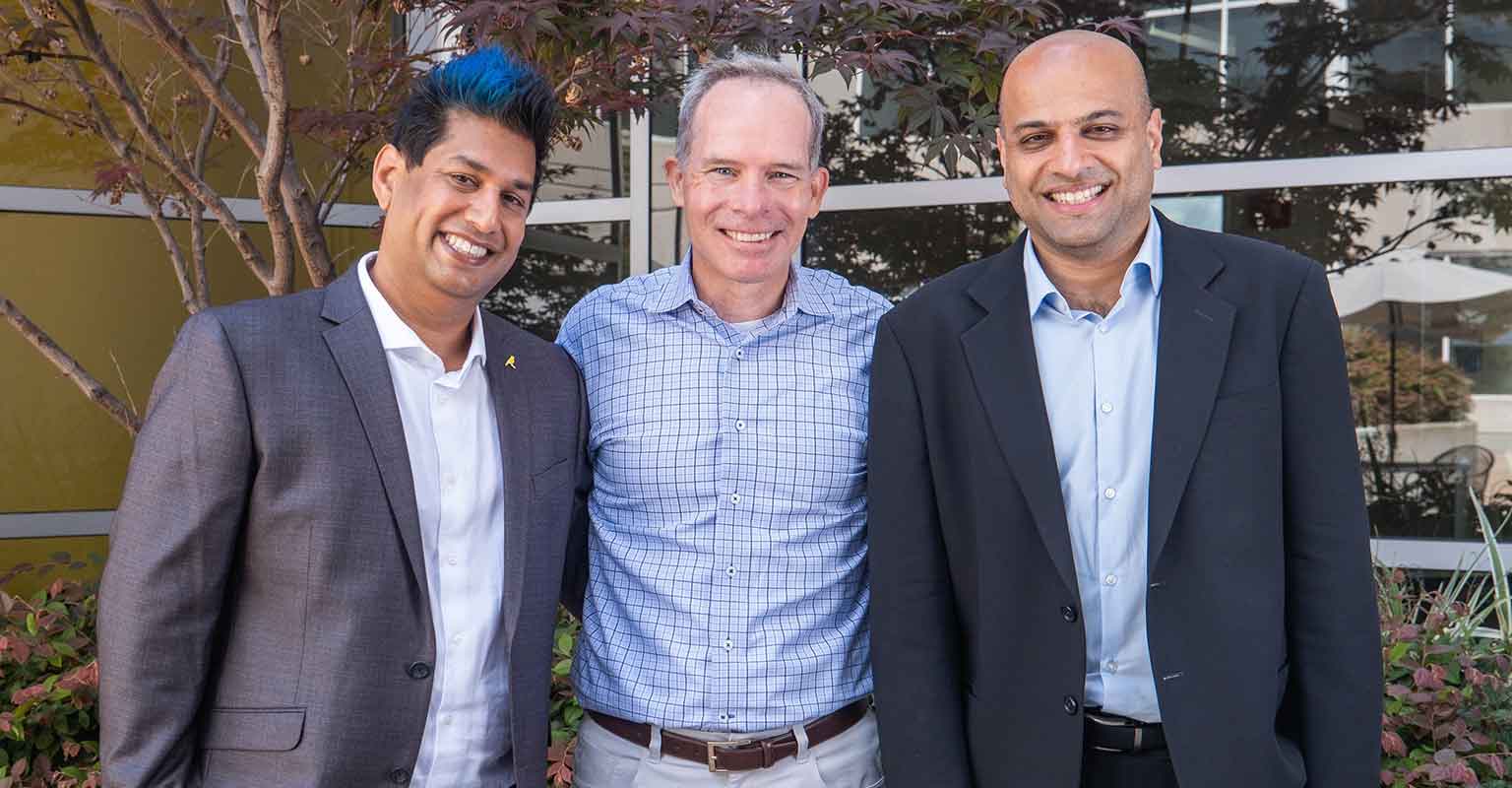Pictured above Co-founders of Nautilus Biotechnology Parag Mallick and Sujal Patel with Matt McIlwain.
Sometimes you have a set of events that lead you to reflect on the past, present and future. This week of June 7th, 2021 was one of those times for me. Four Madrona companies we have partnered with from Day One reached major milestones. But, it is the reflection on four technology investment themes that inspired this post.
In over twenty years as a venture investor helping build companies, four macro investment themes have shaped my investment focus.
-
-
Software “as a service” not just replacing downloadable software and changing how consumers and businesses pay for software, but also replacing personal and professional processes with digital ones.
-
Cloud computing turning “infrastructure” into services that are composable elements of the API-driven application ecosystem and power modern applications.
-
Applied machine learning and data management that enable “intelligent applications” that infer, predict, recommend or simply automate an action that people care about.
-
Leveraging all of the above trends to transform our understanding of life sciences and improve health outcomes at the “intersections of innovation” for all.
-
The evolution of these themes was emphasized this past week as four Madrona portfolio companies hit milestones in their journeys. Each of these milestones also highlight the risks inherent in building companies, the opportunities in taking a “long run” perspective, and the variety of ways that those companies are funding different phases of growth.
Smartsheet and Software as a Service
Madrona invested in Smartsheet in 2007 leading the Series A round. Last week, as an established public company, they announced record billings, earnings and customers cementing their position as a leader in the modern productivity market.
With Smartsheet, we had a relationship going back many years with the founders. And, we had helped set them up as a customer presenter at the April 2007 launch of Amazon Web Services (more on that later). Smartsheet was the first company truly committed to “no code” cloud software delivered “as a service” to that enabled anyone to collaborate and get work done. They originally architected a hybrid cloud model with much of their infrastructure managed at a co-location data center and a portion using AWS’s S3 to store files. And, their initial customers paid less than $500 per year in annual recurring revenues (ARR) to create workflows in the app. Today, the vast majority of Smartsheet’s enterprise-scale platform runs on AWS and their largest customers pay them more than $1 million annually.
Like virtually every company, Smartsheet had a “near death” experience when we came to the conclusion in late 2008 that their front-end design wasn’t intuitive for the customers. That was right during the financial crises and it was far from clear whether we should continue to fund the company. But, we and the management team led by Mark Mader and Brent Frei doubled down and by early 2012 it was clear that Smartsheet was on a path to success.
Smartsheet went public in a “traditional IPO” in April 2018, but it wasn’t until the COVID crisis last year that they faced their hardest challenge as a public company. While many of their nearly 100,000 customers turned to Smartsheet to help embrace the “digital first” season that COVID required, some struggled to stay in business and asked for various types of concessions. Smartsheet took the long-term view with its customers and has emerged from the past year stronger than ever. We are proud of the role we took as a supporter of Smartsheet and we use it every day at Madrona.
ExtraHop and the Enterprise Transformation to Cloud Computing
At that same 2007 AWS launch event where Smartsheet got on stage, I also met Jesse Rothstein and Raja Mukerjee. They had recently left F5 where they served as chief architects for a game-changing product. Their passion for building a company to leverage network data and modern infrastructure to help enterprise applications be secure and performant was palpable. And, as we all contemplated the potential impact of “cloud computing” on the future of enterprise applications, Madrona quickly aligned with them around a seed financing.
ExtraHop’s enterprise customers were initially on-premise, performance focused and accustomed to buying software and hardware with a bundled license. This founding team, complimented by some talented executives and team members, has transformed itself over the past five years in to a security-first, SaaS business that leverages machine learning to make intelligent recommendations to enterprises.
Today, ExtraHop is growing rapidly and generating over $100 million in annual recurring revenue. The opportunity to partner with some exceptional security industry experts and technology-focused private equity investors has led to the $900 million acquisition that was announced this week.
Intelligent Application Company Enabling Important Workflows for Enterprises
The third major milestone this week is a company we helped found a handful of years ago that signed a term sheet for a substantial upround. It is one of several “intelligent application” companies that Madrona has invested in since developing the broader concept of “Dataware” back in 2013. Madrona has been investing in the applied AI/ML sector for 9 years dating back to more horizontal companies like Turi, Algorithmia, Lattice and Xnor.ai. And, in the past 5 years we have focused more on application layer companies that provide better solutions to customer needs based on aggregating data, applying machine learning and seeking continuous improvement in contextually relevant ways. Since the financing is not yet closed, I can’t share more of this story right now, but look forward to doing so soon.
Nautilus Disrupting Proteomics at the Intersections of Innovation
Finally, Nautilus Biotechnology (NAUT) completed their SPAC process raising $345 million of new capital. Nautilus’ transition to being a public company comes almost twenty years to the day from when company co-founder and CEO Sujal Patel and I first started working together at his prior company Isilon Systems. Isilon also had its share of “near death” experiences as a private and then public company with the eventual outcome and impact being exceptional. Today, Isilon generates over $4 billion in annual revenue as part of Dell, and despite the fact that we are now helping Qumulo transform the file data industry in to the cloud, the underlying Isilon technology remains an important part of many workflows.
Those workflows included early genomic sequencing and the rise of cost-effective genomic sequencing powered by illumina. Sujal got to know his Nautilus co-founder, Parag Mallick, as a customer. Later, Sujal philanthropically funded Parag’s lab at Stanford. And, over four years ago, they decided to launch Nautilus to both rethink and reinvent the identification and quantification of proteins. While this journey is still early (the company is not yet five years old), they are making tremendous progress on the road to transforming proteomics. And, Madrona actually chose to invest in the PIPE portion of their SPAC transaction and continue partnering with the company for the long run.
The Journey Ahead
Looking back on the impact of software and SaaS software in particular, the rise of Seattle as the cloud capital of the world, and the acceleration of use cases for machine learning and “intelligent applications” reflects what we are seeing today – a flourishing of our region, and of technologies born here around the globe. Those three macro trends have shaped innovation and venture investing for the past two decades. And, we are still very early in the impact that cloud and applied ML will have our the way we work and live. But, when I look ahead to the next two decades, the intersection of all those technologies with the a deeper understanding of how chemistry and biology work together to create and sustain life is what excites me most.
It is also notable that the founders of all these companies remain actively involved with growing their businesses. And, each of these key financial moments this past week comes in a different form. Smartsheet’s record earnings highlight how they have been a good steward of public investor’s capital and consistently grown their revenues and market cap while investing wisely. ExtraHop is teaming up with private equity investors and security industry executives from Crosspoint and Bain to help expand their impact in intelligent enterprise security and cloud workloads. You will soon hear more about the intelligent application company I referenced above who is transforming an important sector of enterprise operations. And, today marks the completion of Nautilus’s SPAC transaction process where they raised $345 million of new capital to lead the transformation of proteomics.
I doubt that another week will come along where four companies, spanning these major investment themes, all have financially momentus milestones. However, I am confident that the Madrona team will always be a champion and advocate as these four companies continue to grow and positively impact the world. Even more importantly, we are excited to see how these broader investment themes, especially at the intersections of innovation, improve lives everywhere.


